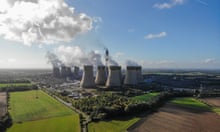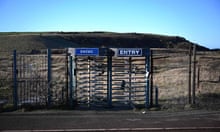National Grid has fired up a coal-fired power station for the first time in 55 days after Britain’s record-breaking heatwave brought wind turbines to a near-standstill and caused gas-fired power stations to struggle.
The electricity system operator brought Britain’s latest coal-free streak to an end by calling for the Ratcliffe-on-Soar power station in Nottinghamshire to begin generating electricity before a peak in electricity demand.
Electricity supplies have become tighter than expected during the heatwave because gas-fired power stations have struggled to generate electricity at their maximum capacity owing to the unusually high temperatures. At the same time wind turbines have slowed because of low wind speeds.
A string of power stations were unable to produce electricity on Wednesday because of planned maintenance work which often takes place during the summer, but even available gas plants produced less electricity than usual owing to the heat.
Gas plants can struggle to produce electricity at normal levels during high temperatures, according to experts at the energy data company EnAppSys, and it is normal for their power output to fall during heatwaves. They rely on a steady flow of air through its compressor, according to the energy technology firm Wartsila. It takes more energy to compress hot, humid air to the same mass as air which is cooler and drier, so many power plants become less efficient as the outside temperature rises.
Thomas Edwards, an analyst at consultancy Cornwall Insight, said: “I feel solidarity with the power stations finding it too hard to do anything today.”
Electricity output from Britain’s wind farms, which generated 30% of the UK’s electricity in the first quarter of this year, fell to lows of 4% on Wednesday afternoon.
The UK recorded its hottest August day in 17 years as temperatures climbed to over 36C earlier this week, and hot temperatures set a new record for central London for the longest stretch of high temperatures in almost six decades.
Ratcliffe is one of Britain’s few remaining coal-fired power stations, which are all due to shut down by 2025 under the government’s ban on coal-fired power.
“It brings to an end the coal free run, but Britain has operated for almost 3,300 hours without coal so far in 2020 – over 60% of the year,” National Grid said via Twitter on Wednesday afternoon.









